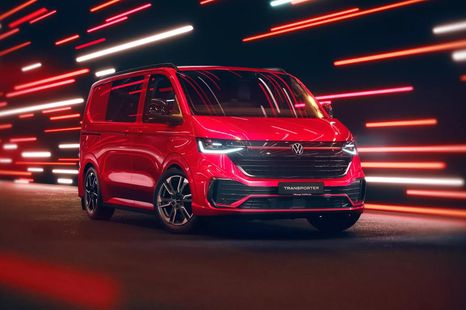

Derek Fung
Volkswagen Transporter given GTI styling treatment
8 Days Ago
Ford’s Transit Custom Sport proves that you can let your hair down when you’re taking care of business.
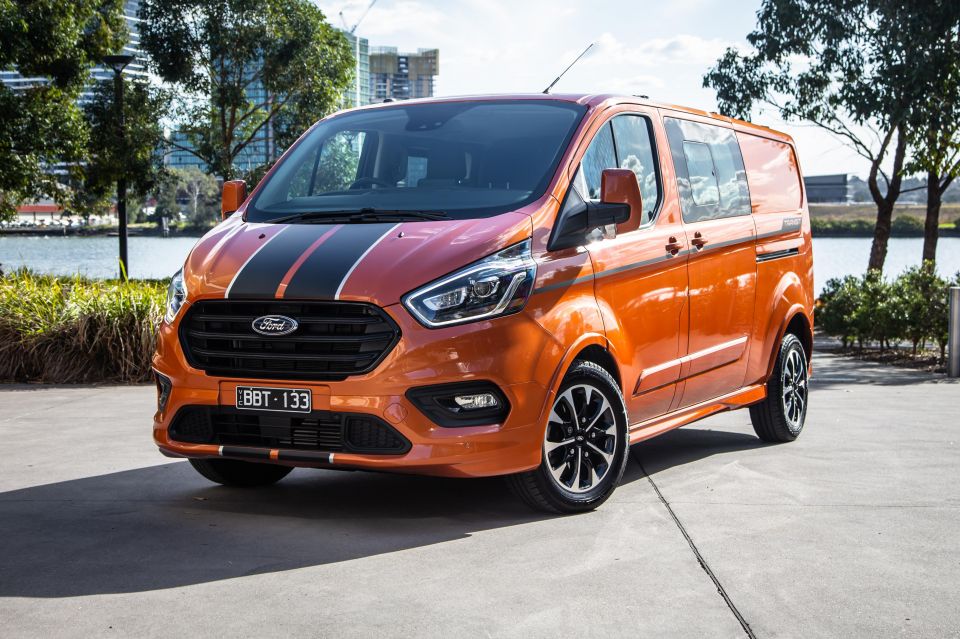
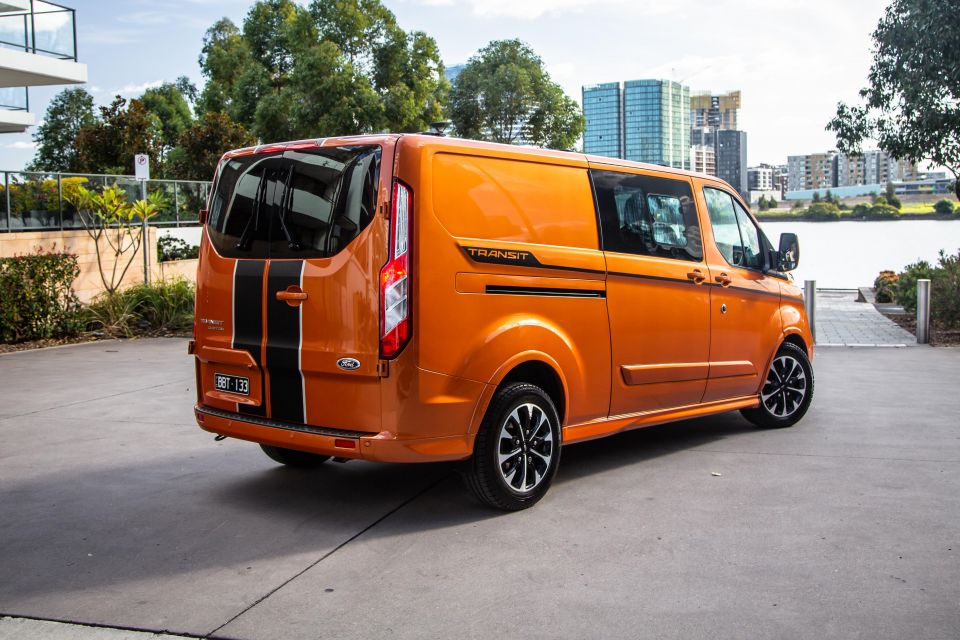

Quickly see how this car stacks up against its competition. Select any benchmark to see more details.
CarExpert brings reviews, research tools and trusted buying support together, guiding you from research to delivery with confidence.
There’s a joke, a very European joke, asking what’s the fastest vehicle on the road. The punchline: a delivery van.
Sure, answers do vary depending on location and the company you keep – “hire car”, “someone else’s car” and “press car” often bandy about in my circles. And, of course, the spirit of the response is that it’s not the vehicle itself necessarily causing ‘fast’…
But what if…
Europeans and Brits have cottoned on to sporty vans for quite some time now. No so much ‘fast’, mind, but in the case of the 2020 Ford Transit Custom Sport 320L, it’s a little ‘faster’ than an example bereft of ‘Sport’ in its name.
And with its pearl-effect Orange Glow paintwork with dark grey – yes – racing stripes, as tested here, it perhaps ought to be.
A fast(er) sport(ier) van. What a beaut idea!

The Sport 320L is the Swiss army knife big daddy of the Ford Transit Custom range. Essentially, it offers similar dual-cab practicality to the regular 340L LWB van, dressed in activewear and powered by a higher-output 136kW/405Nm 2.0-litre EcoBlue diesel rather than the regular non-Sport 125kW/390Nm unit.
It’s one of two Ford offers. If you don’t want or need second-row seating for workmates or kids, there’s a two-seat, short-wheelbase 320S Sport that packs the same racy look and engine upgrade in a more dedicated load-lugger.
Let’s face it: it’s really a double-edged sword this hefty van needs to negotiate. On one edge, it needs to be utilitarian and work friendly even for something that looks that flashy. On the opposite, it should also be quicker and extra fun, otherwise you’d buy a regular commercial van and save some cash, right?
And given our tester is also ‘someone else’s press van’, it might well be as swift as it looks…

As the Ford Transit Custom range-topper, the Sport 320L lobs at a formidable $54,090 before on-road costs. That’s $3500 more than the ‘white goods’ look dual-cab 340L DCiV or, depending on your priorities, $5000 more than its equally outlandish and powerful, two-seat, short-wheelbase Sport 320S twin.
The Sport 320L is six-speed automatic only. And in Australia at least, it’s the sporty outlier on the light commercial fringe. But should you cross-shop crew-friendly machinery, Ford’s Sport 320L wants for much more money than the Hyundai iLoad Crewvan Twin Swing, at $42,250 list.
Meanwhile, Toyota’s diesel auto HiAce Crew LWB is $47,140 before on-roads. Still, the Ford isn’t nearly as pricey as the Mercedes-Benz Vito Crew Cab LWB, which asks for $63,170 list in nice ‘119’ spec.
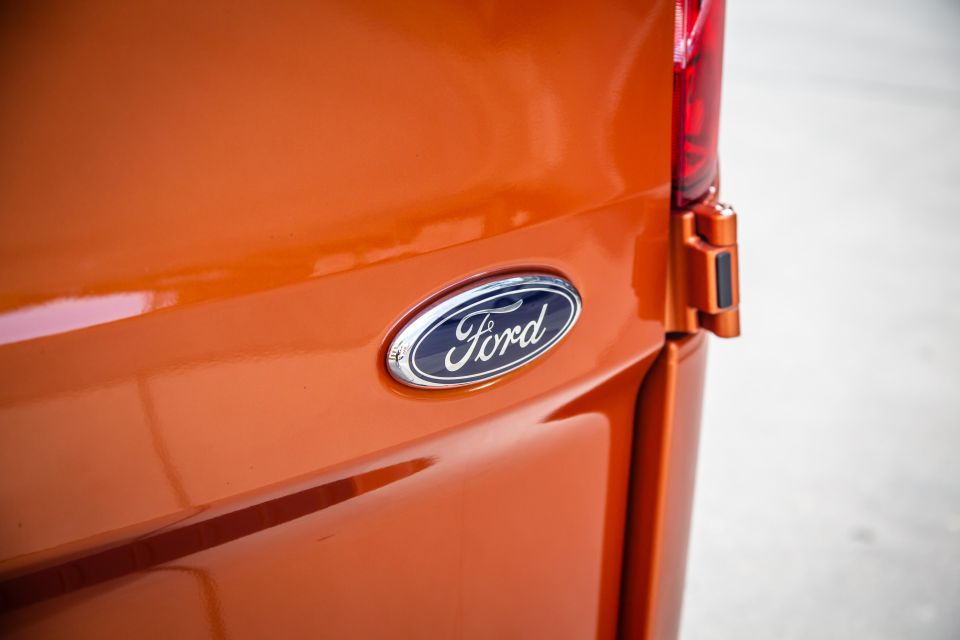
In a segment with dizzying choice and options, Ford’s single-spec crew-friendly Sport is priced realistically around the middle of the landscape.
Some buyers will choose standard white paint, though you do lose half of the go-faster effect opting out of Orange Glow (or four other arresting metallic colours) that add $650 to the cost.
Unsurprisingly, there’s a host of cost-optional towing, stowing and lugging accessories, but the only real factory option available is a liftgate rather than the 180-degree barn doors, which adds a further $550.
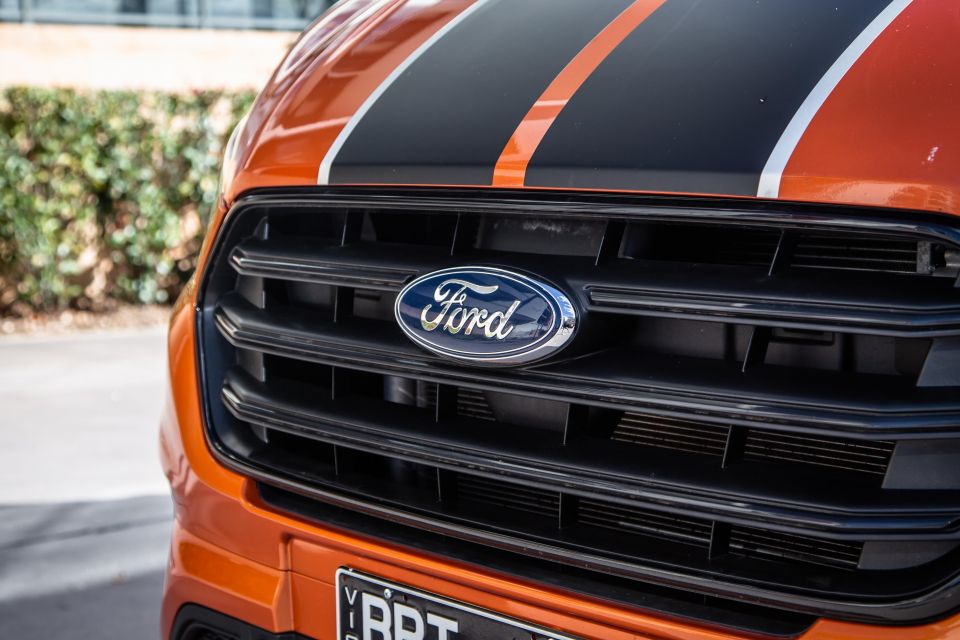
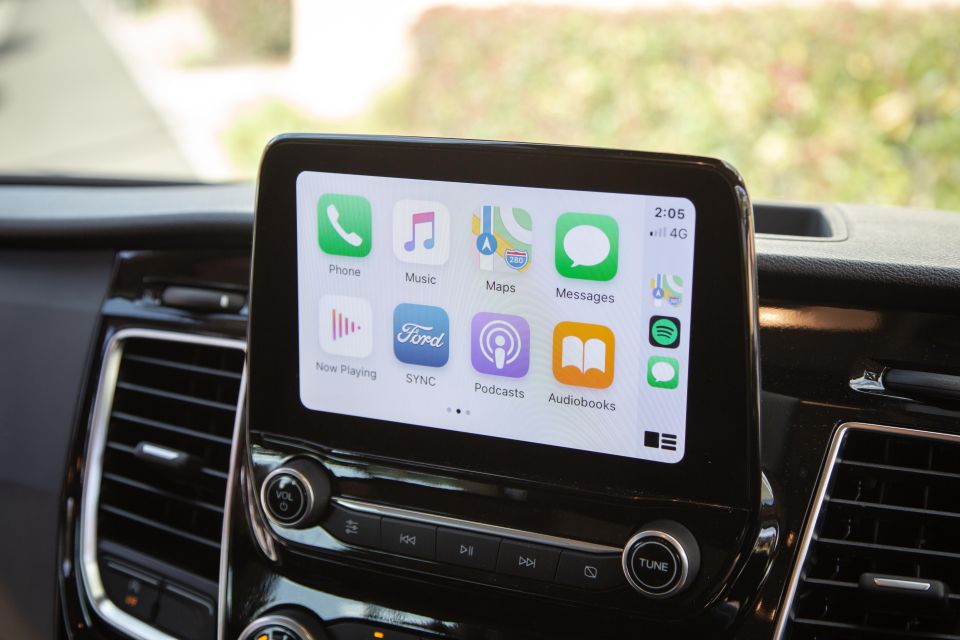
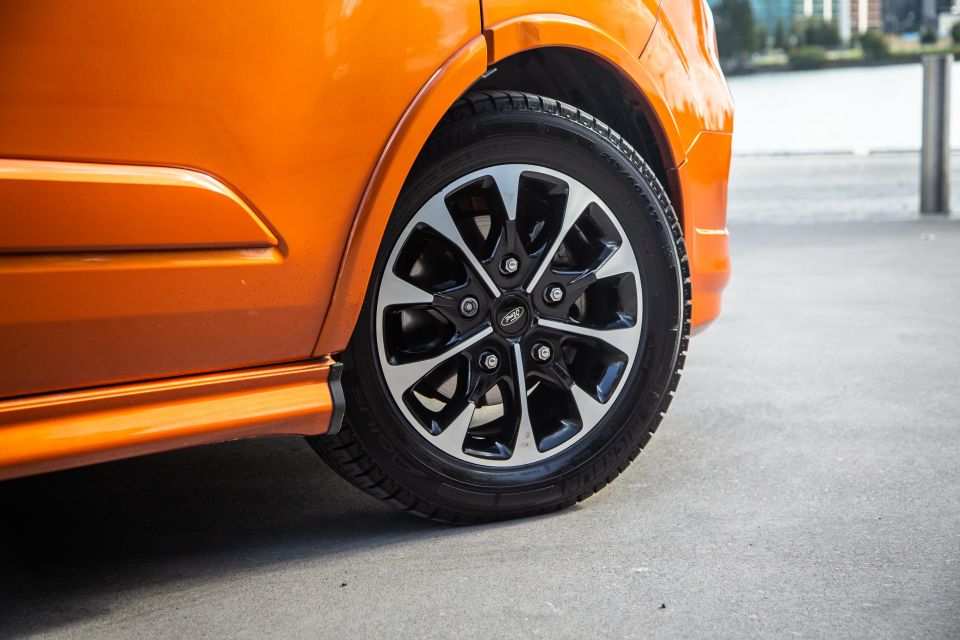
Buy your new car without the stress. It's fast, simple and completely free.

Great service from Travis and team, second time I have used this business would not hesitate to recommend them to anyone
Craig C.
Purchased a Ford Ranger in Sunshine Coast, QLD
CarExpert helped Craig save thousands on his Ford Ranger, now let us save you on your next new car.
Find a dealLet’s start with the obvious stuff. ‘Sport’ spec adds the high-output engine, 17-inch black/machined face alloy wheels, a sports body kit, colour-coded bumpers/side mouldings/mirrors, racing stripes and decals.
Otherwise, exterior equipment includes static-bending bi-xenon auto headlights, auto high-beam, LED tail lights, heated electric mirrors, rain-sensing wipers, power front windows, a heated windshield, a rear window de-mister, dual sliding side doors and a 130kg roof rack.
Low-speed AEB with pedestrian detection and adaptive cruise control are standard issue too.
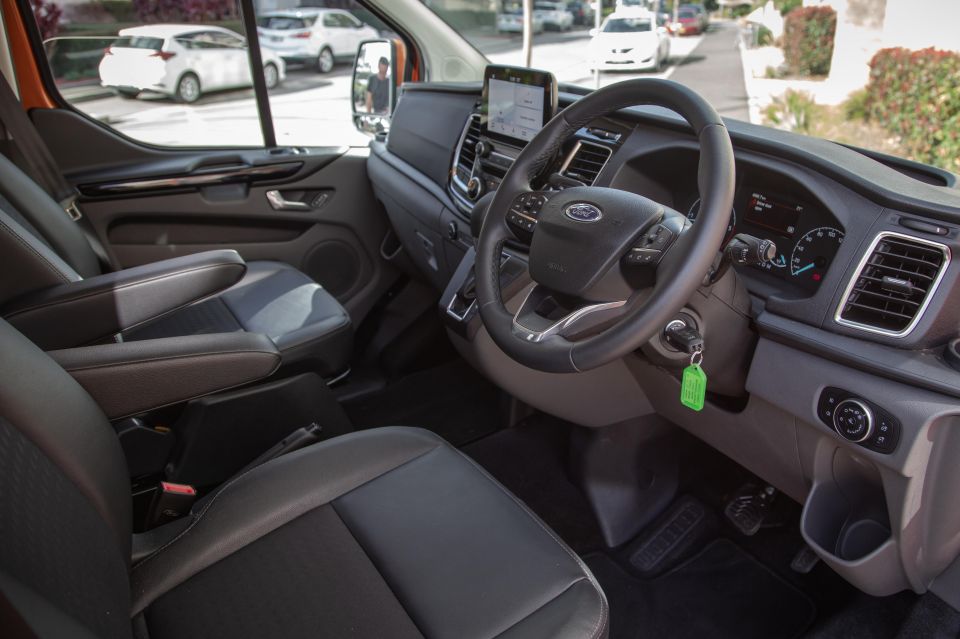
Inside, the Sport 320L gains partial leather seats with ‘sports’ trim and front heating, 10-way electric driver’s seat adjustment, and foldable arm rests.
Elsewhere there’s a leather multifunction steering wheel, a 4.2-inch colour driver screen with digital speedo, a 230-volt power inverter, dual USB ports, three 12-volt outlets and more oddment cubbies, trays, and slots than you might care to count.
Infotainment is an 8.0-inch Sync 3 touchscreen with Apple and Android smartphone mirroring, DAB+, proprietary sat-nav and FordPass Connect modem (remote phone connectivity). A reversing camera with adaptive guidelines and both front and rear parking sensors are welcome fitment to such a large van.

At eight years young, the Transit Sport is no spring chicken and expectations for safety have become tougher since the range scored its five-star ANCAP rating back in 2016. That said, Ford’s mid-sized commercial series boosted its safety credentials in its 2019 facelift and ANCAP revisited the updated range earlier this year.
The whole Ford Transit Custom range is impressively solid for active safety, fitting autonomous emergency braking with pedestrian detection and pre-collision assistance, lane-keeping assist, lane departure warning, blind-spot monitoring and rear cross-traffic alert.

The reversing camera with front and rear sensors bolster safety chops when parking and there’s a robust bulkhead separating the cargo and passenger areas to prevent payload intrusion in a violent stop or frontal impact situation.
Adaptive cruise, too, brings obvious safety benefit on the highway or open road. Further, the Ford fits less conspicuous smarts such as roll over mitigation, side wind stabilisation and trailer sway control calibration for the stability control system.
The Transit Custom Sport gets front, side, chest, and curtain airbags for the first row, though there are no curtain airbags for row two, the only real black mark on an otherwise impressive showing.
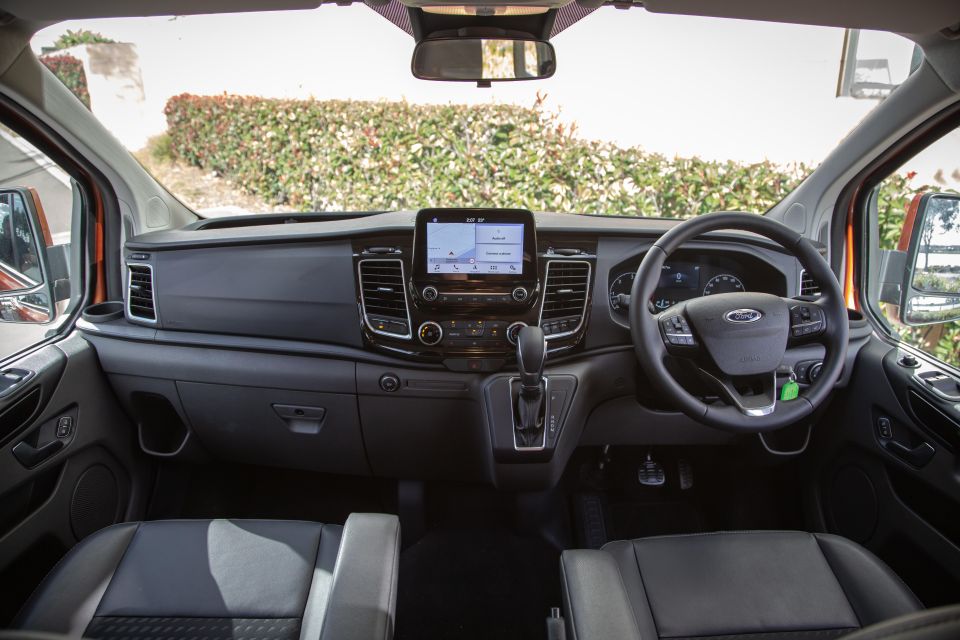
While some crew cab vans offer six seating positions, the Transit Custom Sport is a dedicated fiver and it suits the work’n’play theme a treat.
The front buckets are excellent, comfy and supportive enough for long stints, with generous legroom and foldable arm rests to match the fixed outer rests atop the windowsills. Between the seating position and inspired ‘low-cut’ glasshouse design, forward and side vision is exceptionally good and the neat split-level wing mirrors all but eliminate the kerb-side blind spot.
With its bluff dash fascia and nearly flat floor the Sport feels very roomy and goes some way to ridding itself of the humdrum commercial ambience.
There are nice passenger car-like flourishes in key areas such as the ‘sports’ wheel, the colourful instrumentation and slashes of piano black and metallic brightwork that wouldn’t be out of place in a luxury car. Ditto the rubber-ringed stack controls and fulsome infotainment fit-out.
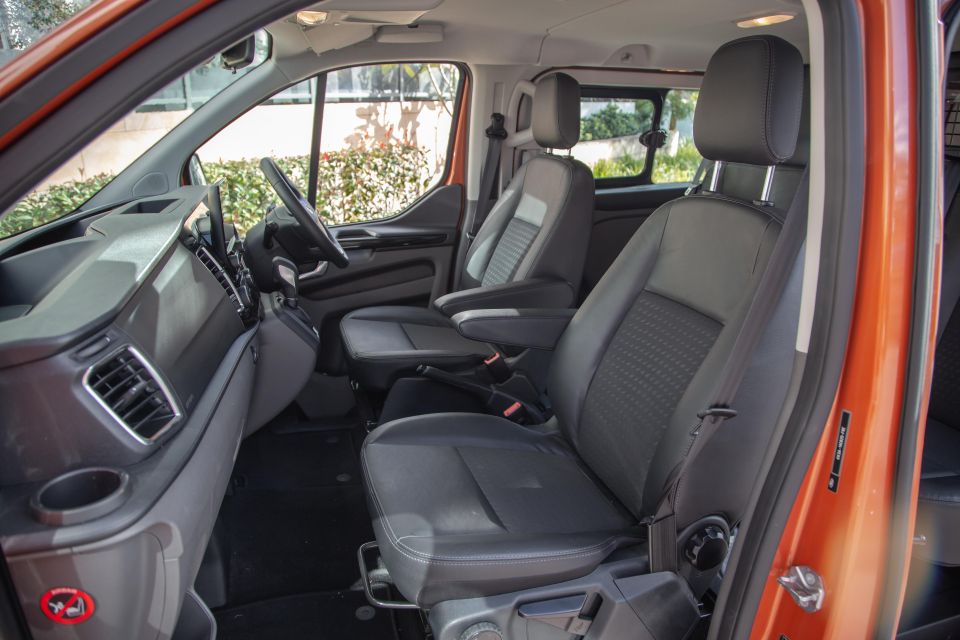
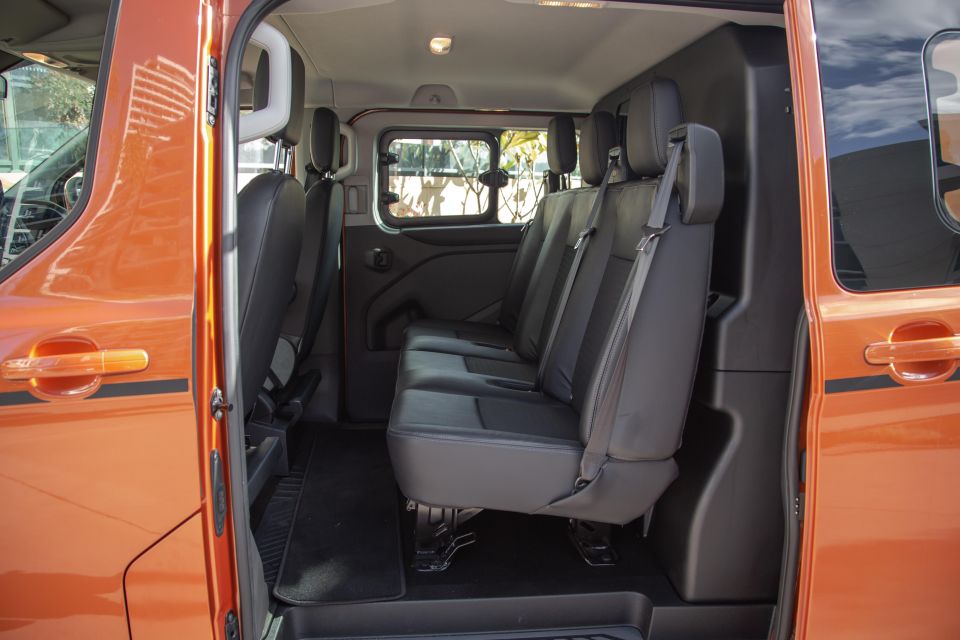
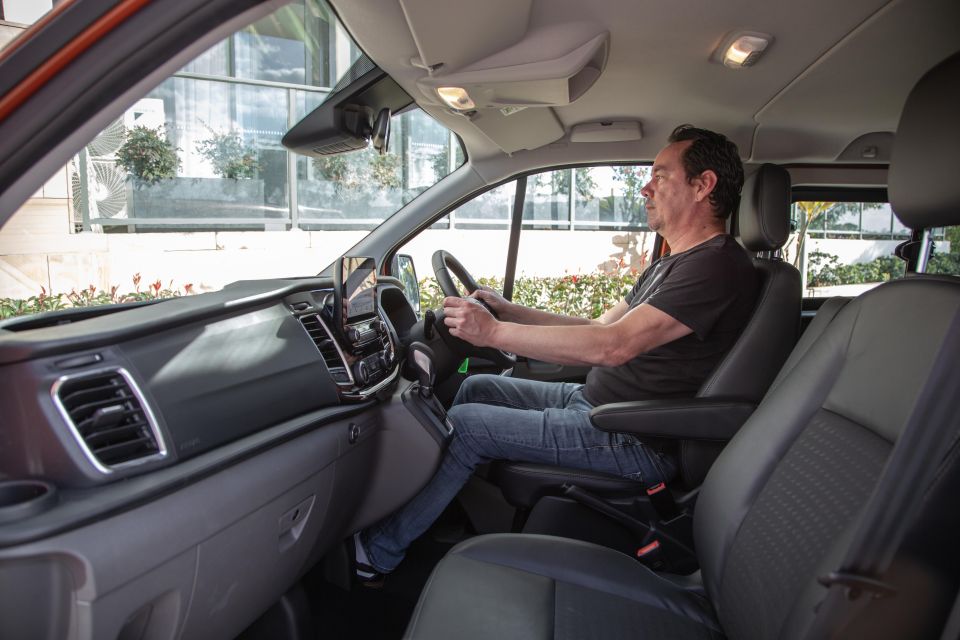
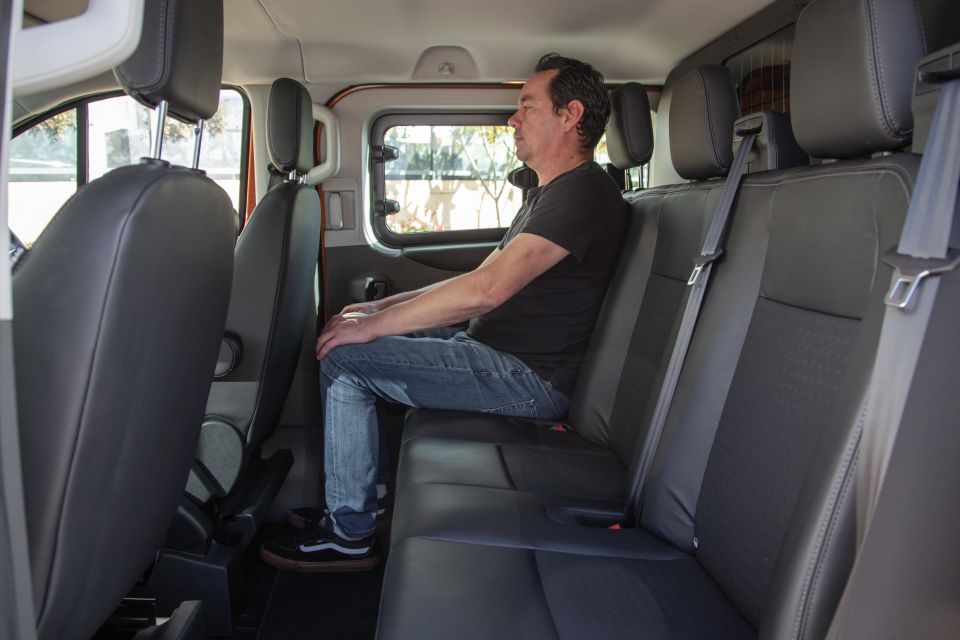
It’s not all upper crust: some of the plastics are cheap, the dash-top rubber tray inserts are flimsy and the otherwise handy 150w/230-volt power inverter outlet beside the driver uses a British three-pin socket.
But when it comes to stowage smarts, there’s somewhere for everything, with dual-bottle and single-cup holders, a USB and a 12-volt outlet on either side for both front occupants.
If there’s one small omission up front, it’s that there’s no grab handle to help when climbing in, as is fitted in row two.
The second row of seating offers impressive width and shoulder room and headroom is pretty decent, but the otherwise comfy accommodation suffers from a very upright seat back. There are also no air vents or device power and the pop out windows only relieve stuffiness mildly. As a surrogate family vehicle, it’s functional is not exactly ideal, particularly given the lack of rear curtain airbags thrown into the equation.
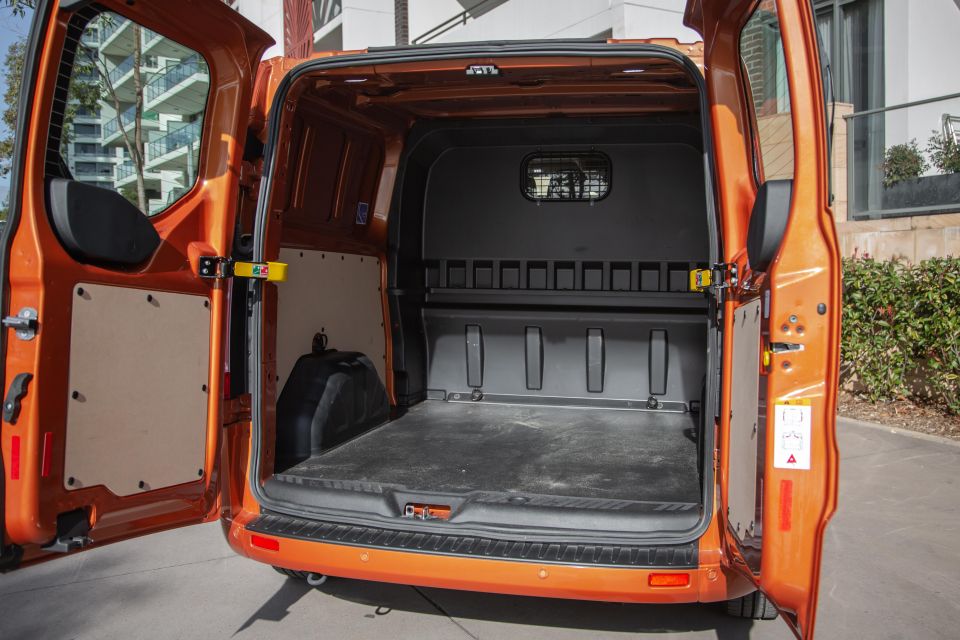
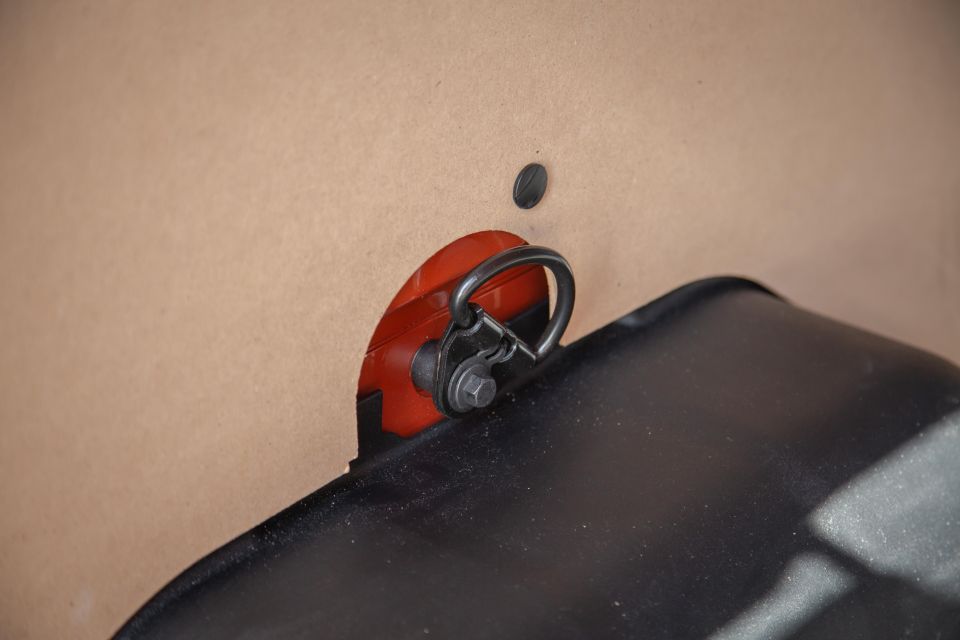
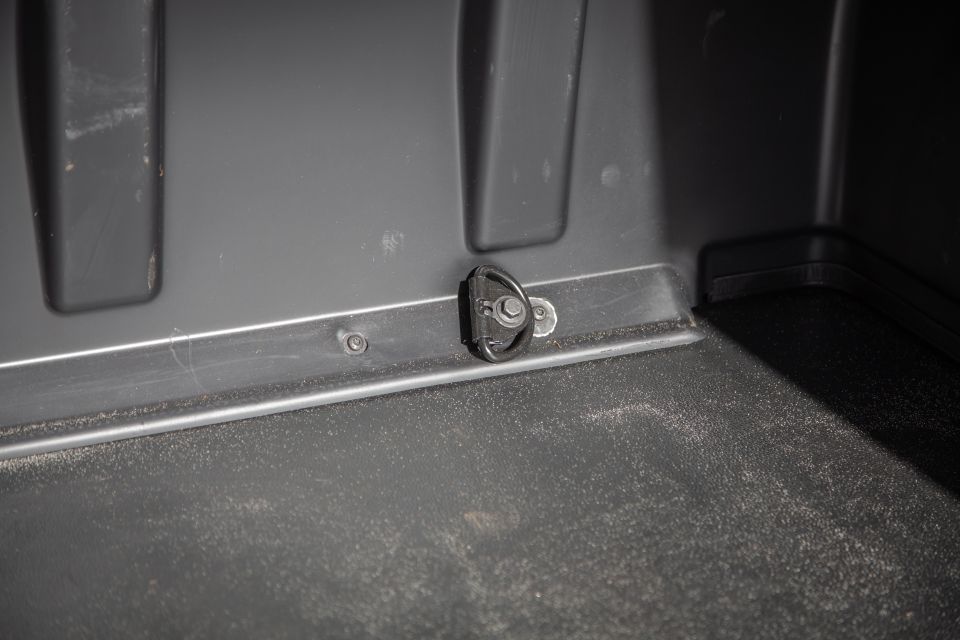
As a stalwart of the van world, there’s nothing poorly-conceived about Transit Custom’s cargo area. Total volume is 4.4 cubic metres, with a maximum load length of 1944mm at the floor and 1872mm at the belt line. There’s a handy, palette-friendly 1392mm width between the wheel arches, with a maximum width of 1775mm to play with if need be.
Load height is 536mm, above which there’s 1406mm from floor to ceiling and 1404mm of width with the barn doors wide open. The doors have a neat hinge system, too, with an initial 90-degree position and further 180-degree swing if the user requires.
Ignoring the figures, though, it’s an impressively practical and easy to access space provided you’re not dealing with excessively lengthy objects. Further, replaceable wood paneling, an extra 12-volt outlet and LED cargo area lighting are nice added touches.
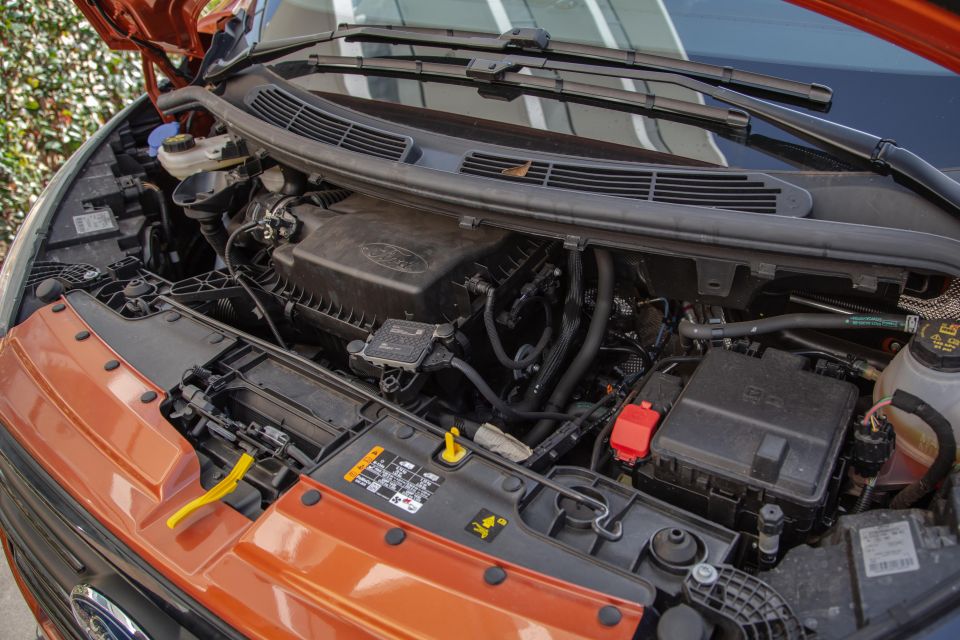
While the 2.0-litre turbo diesel four in regular Transit Custom variants copped a decent output hike to 125kW and 390Nm in 2019’s facelift, opting for the Sport bumps the numbers up a bit to 136kW and 405Nm. That’s not huge advantage – and Aussie Sports are strangely 10Nm down on those in Europe – but it’s a healthier tune of the EcoBlue engine nonetheless.
Peak torque sits in a narrow 1500-2000rpm band while maximum power arrives at just 3500rpm, though as we discover delivery is flatter and rounder than the figures suggest. And while it lacks the sheer cubic capacity of the 2.8-litre HiAce or 2.5-litre iLoad, its claimed combined consumption of just 7.3L/100km is pretty impressive given that, at 2231kg kerb, it’s an already hefty bugger before you load in crew and cargo. Tank size is 72 litres.
GVM is 3200kg with a maximum payload of 969kg – down from the regular crew cab’s 1149kg. There’s no penalty in braked towing, though, which is 1800kg whichever DCiV variant you choose. Unbraked towing is a 750kg maximum, while the roof rack load is rated for 130kg.
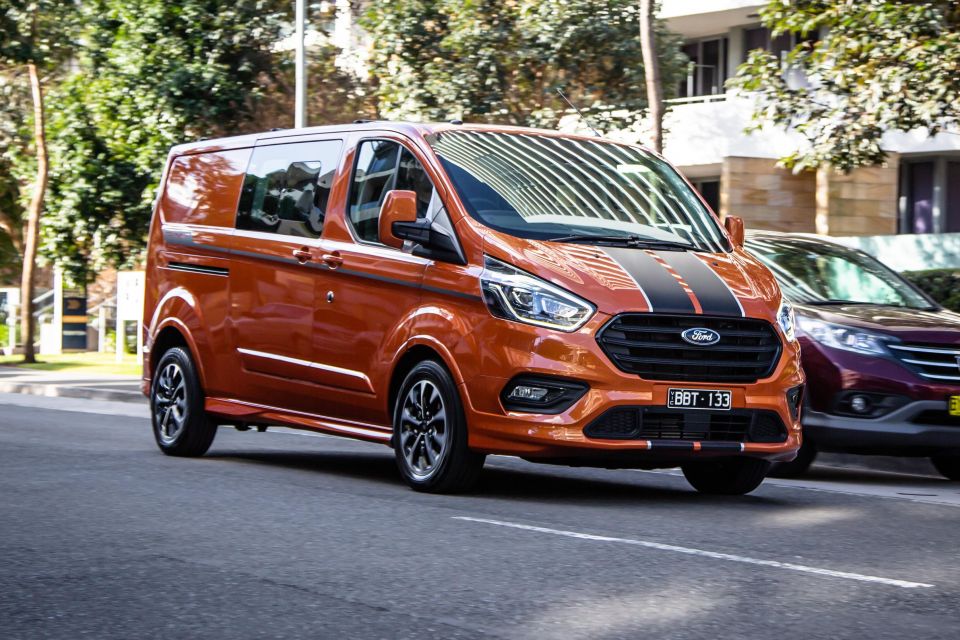
On balance, the flagship Transit Custom is nice to drive. In fact, it’s downright pleasurable.
It’s not quick. Unsurprising, really, for a 2.0-litre diesel dragging such a large machine by the front wheels. But it’s no slouch either. In fact, it gets along pretty briskly indeed with a nice crisp response.
The auto is cooperative and the powertrain feels generally under-stressed even at a decent clip. Granted, I didn’t get anywhere near testing its GVM rating but it seems to have plenty of herbs in reserve for times when you’ll need to start loading it up to the roofline.
There are two drive modes – normal and economy – though the latter killed throttle response to such a degree that I’d probably keep it set to the former exclusively, where the diesel consumption wasn’t that far off its claimed combined best anyway.
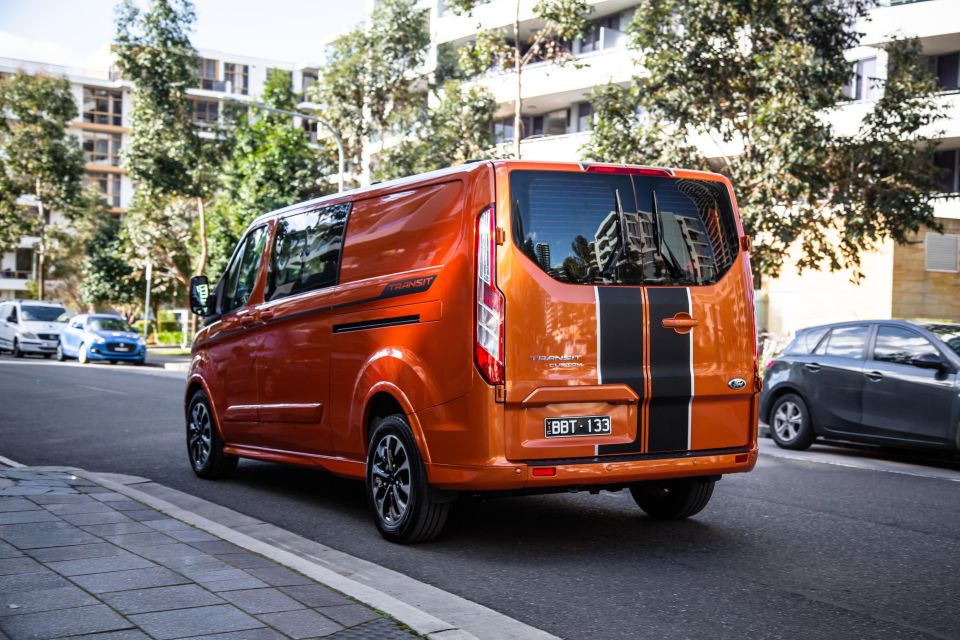
CarExpert brings reviews, research tools and trusted buying support together, guiding you from research to delivery with confidence.
The Ford Transit Custom Sport is also an impressively direct vehicle at the controls. It steers nicely, remains composed, offers confident braking and has almost car-like cooperation to the driver’s whims.
Importantly, it’s no a chore to pilot on or off the job and, parking space permitted, you could easily use even this long-wheel-base version as a daily commuter by choice.
The ride comfort, too, is quite impressive. Certainly a damn site more polished than many dual-cab utes. It’s also quite quiet on the move or, at least, as quiet as you could reasonably expect a large metal box to be. But is it certifiably ‘sporty’ by dynamic measure? Well, perhaps not so much…
Because forward and side visibility is so good, it’s easy to place on the road and to carve through traffic or the inner city confines provided you’re conscious about a couple of things. Firstly, it has quite a wide track, so you quickly learn to give roundabouts and kerbs a wide berth as those rear alloys are easily clipped.
Secondly, it seems a little taller than specs suggest – 2.04m without racks, 2.13m with racks fitted. I found the van barely squeezed into the home garage and one local shopping centre carpark, and was too tall for my other local multi-story parking area. That flimsy rubber aerial on the roof cops a real hiding…
It does have a hefty 13-metre turning circle though, really, that’s expected from a 5.34-metre-long van with the 3.3-metre wheelbase. Rearward vision through a bulkhead port and barn doors is nearly non-existent so you’ll be using the well-calibrated sensors and decent camera system regularly.
Frankly, the fact that just finding somewhere wide enough to open it doors and long enough to fit its form without hanging its nose or rump in traffic is really the only main compromise to regular daily usage.
Otherwise, it’s behaviour on road is quite impressive and certifiably enjoyable.
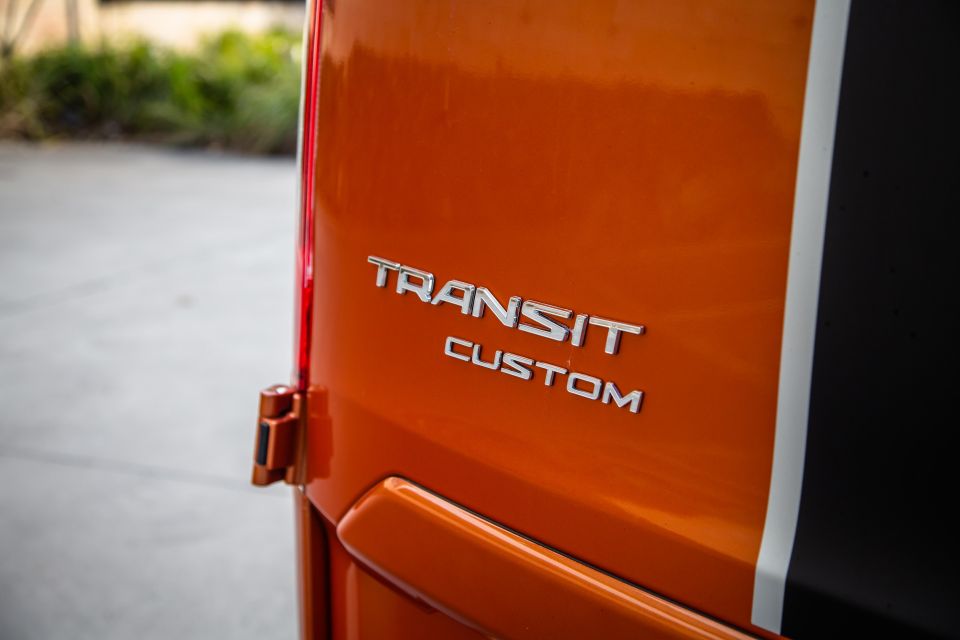
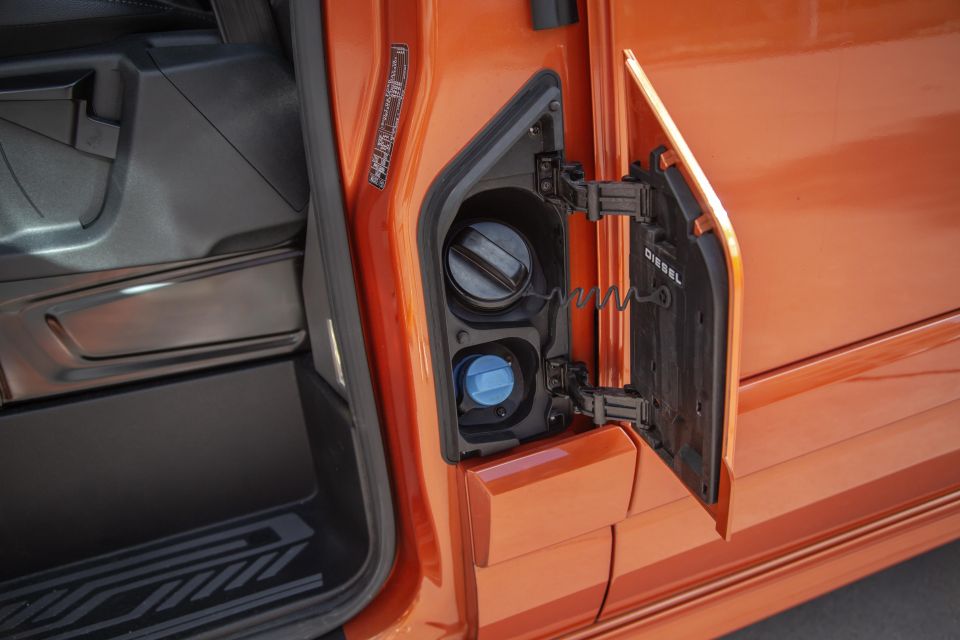
Ownership wise, the Transit Custom is covered by a five-year, unlimited-kilometre warranty.
Service intervals are 12 months or 30,000kms, with basic servicing capped between $420 and $530 per visit over the first five years, not including additional charges for brake fluid ($80) and pollen filter ($60) every two years/60,000kms.
As a small added running cost, the Euro 6.2-compliant 2.0-litre diesel requires AdBlue and the Transit Custom fits a 21-litre tank. Each fill lasts 9000-11,000kms, says Ford, at $75 a pop.
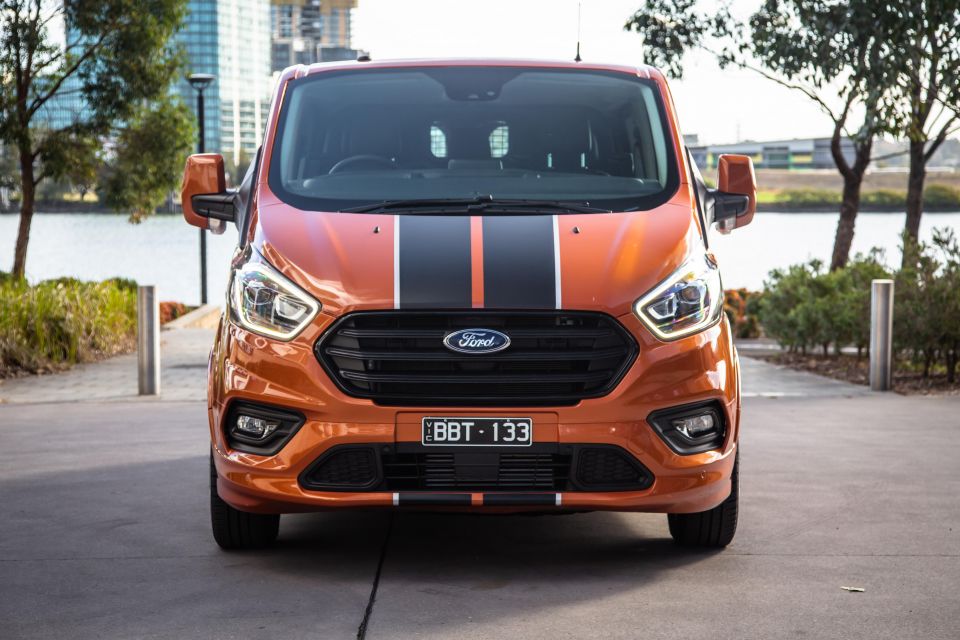
I really enjoyed my time with the big daddy Transit Custom Sport, even keenly aware of the fact that I wasn’t coming close to fully utilising the practical people- and load-lugging convenience you’d actually need one for.
For a self-confessed non-van bloke, this ‘racing van’ could probably convert me. It’s just more satisfying to punt around than I’d expected such a large commercial van to be.
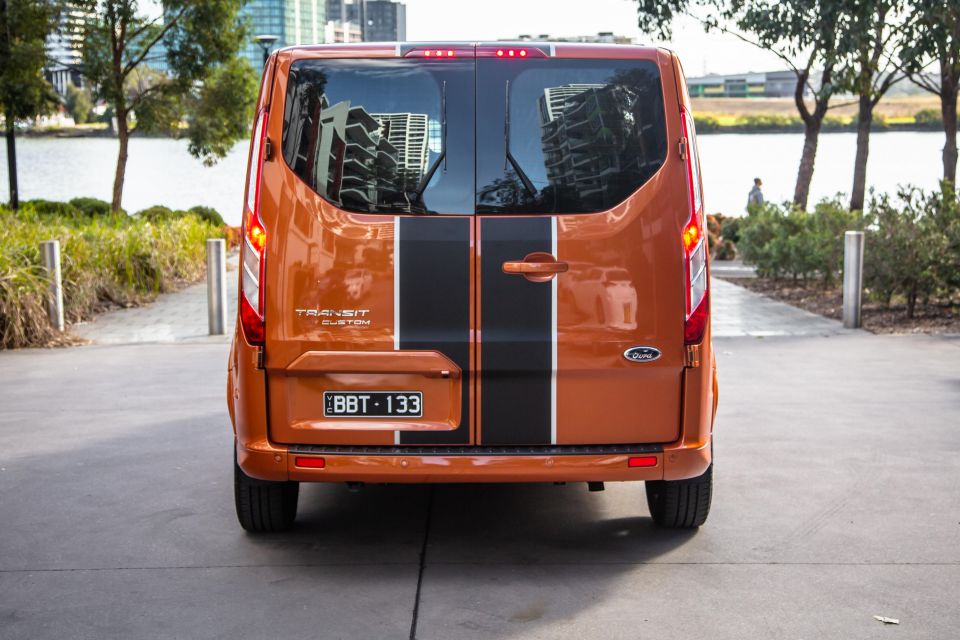
I’d love to try the short-length two-seat van some time, for no other reason than I reckon it’d probably be a bigger hoot to run about in.
The garish if appealing looks wont be to everyone’s tastes though, of course, Ford does a ‘white goods’ version for less investment. It’s just great to have a choice, right?
And judging by how many tradies in fridge white light commercials gave me the thumbs up or commented on the Custom Sport’s appearance in just one week of punting it about, a bit of sporty bling to the workhorse landscape is a good thing… if you’re not into the me-too dual-cab ute thing or it simply doesn’t suit your needs.
CarExpert brings reviews, research tools and trusted buying support together, guiding you from research to delivery with confidence.
Ford Transit Custom
Ford Transit Custom Sales rolling 12-months#
*Based on VFACTS and EVC data
Looking for complete Ford Transit Custom price history?
Our Ford Transit Custom Pricing Page shows exactly how prices have changed over time.
2026
$56,590
2025
$56,590
2026
$59,990
2025
$59,990
2026
$61,990
2025
$61,990
Add CarExpert as a Preferred Source on Google so your search results prioritise writing by actual experts, not AI.


Derek Fung
8 Days Ago
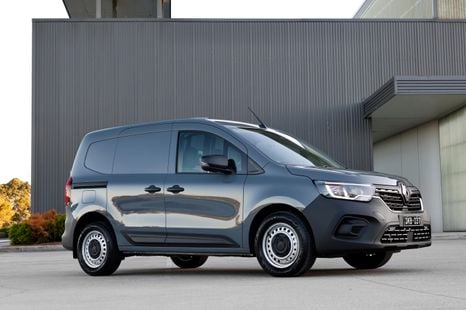

Marton Pettendy
9 Days Ago
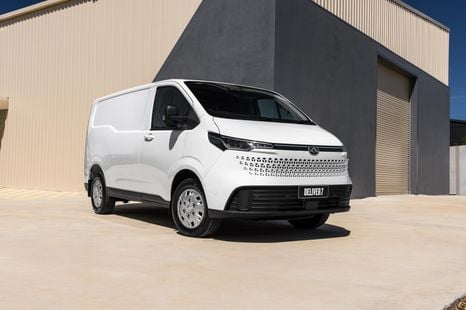

Damion Smy
11 Days Ago
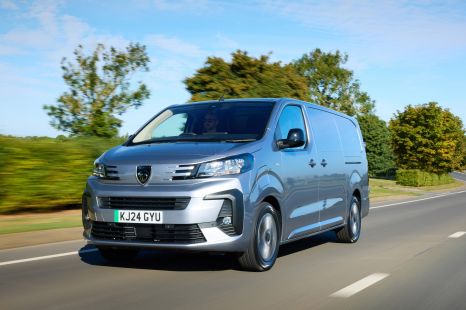

Damion Smy
1 Month Ago
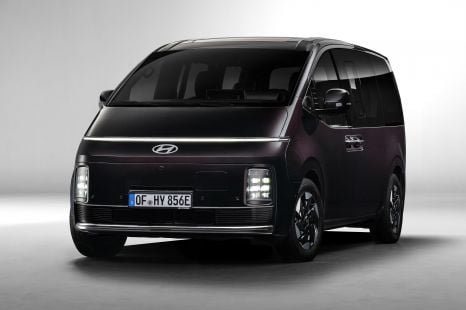

Derek Fung
1 Month Ago
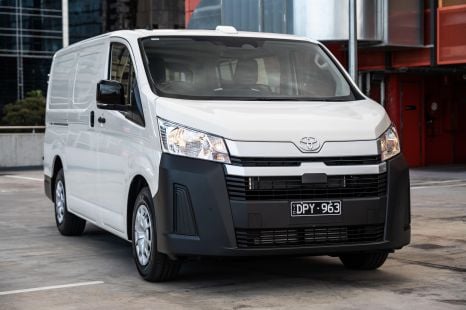

Max Davies
2 Months Ago
Add CarExpert as a Preferred Source on Google so your search results prioritise writing by actual experts, not AI.
* Average savings based on recent CarExpert customer transactions. Actual savings will vary depending on vehicle make and model, location, stock availability, and other factors.
† Displayed prices exclude on-road costs such as delivery charges, registration fees, number plates, insurance and applicable road taxes. These prices are subject to change without notice and may not reflect current market pricing or dealer offers.
 Automotive Vehicle Spec Data & 4K images Powered by JATO Dynamics Ltd
Automotive Vehicle Spec Data & 4K images Powered by JATO Dynamics Ltd